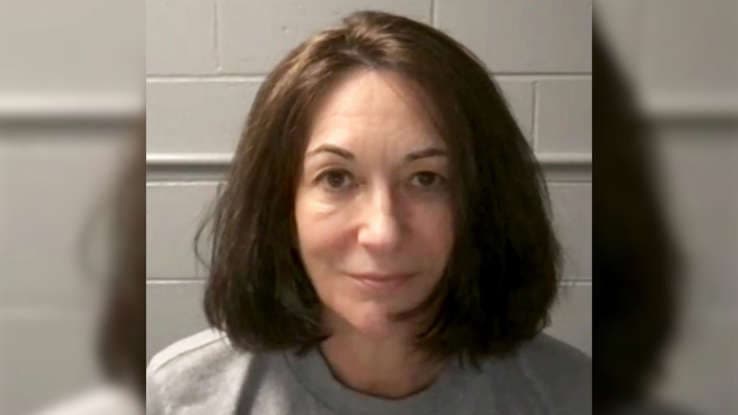‘A Reward for Cooperation’: Ghislaine Maxwell’s Covert Transfer to Cushy Prison in Texas Suggests Special Treatment
‘There’s a quid pro quo going on here based on her cooperation,’ a source with direct knowledge tells the Sun.

The Bureau of Prisons’s covert transfer of Ghislaine Maxwell to a minimum security facility at Bryan, Texas, from a rough prison in Florida is considered “highly unusual” and hints at favorable treatment from the Department of Justice in exchange for her cooperation, sources said.
“I firmly believe this was a ‘You give us this, we’ll move you to Bryan’ kind of arrangement. A reward for cooperation,” a source with direct knowledge of her transfer tells The New York Sun, which broke the story Friday.
“I think she’s getting something in return for something — there’s a quid pro quo going on here based on her cooperation. It clearly stems from what she gave the DOJ during that long interview. She must have shared data, intel — some facts — about the Jeffrey Epstein case and the related parties. And in return, possibly as step one in a larger deal, she was granted some concessions to make her life a little more comfortable,” the source said.
While no official explanation has been provided for Ms. Maxwell’s transfer, insiders say this kind of extraordinary intervention is rarely, if ever, granted to a serious sex offender. It may, they say, be a sign that strings are being pulled in Ms. Maxwell’s favor.
“I’ve never seen them do this for a sex offender public safety factor,” a federal prison consultant tells the Sun of the arrangements made for Ms. Maxwell, a British socialite serving a 20-year sentence for her role in Jeffrey Epstein’s underage sex-trafficking ring.
Ms. Maxwell’s move comes just a week after her two-day meeting with the deputy attorney general, Todd Blanche, in which she fielded questions over her knowledge of Epstein’s illegal activities. Despite the considerable time Ms. Maxwell has left on her 2022 conviction for sex offenses involving minors — she is not due for release until 2037 — her move to FPC Bryan in Texas could be the result of a rarely granted waiver provided by the Bureau of Prisons’s Designation and Sentence Computation Center, known as a Public Safety Factor Waiver.
A PSF waiver is granted to an inmate based on both the nature of the offense and the length of the prison sentence. It signals a need for “additional security measures be employed to ensure the safety and protection of the public,” according to a Bureau of Prisons document. One of those factors includes “Sex Offender.”
While PSFs can be waived, the Designation & Sentence Computation Center administrator must apply a PSF waiver, effectively permitting the PSFs to be waived, and the inmate transferred to a lower-security facility.
In 2012, the BOP changed how it granted PSF waivers, giving the DSCC administrator the authority to grant, or deny, such waivers. While PSF waivers are regularly applied for sentence length, a federal prison consultant, Christopher Zoukis, tells the Sun that it is “virtually unheard of” for a “sex offender” PSF to be waived.
“So very clearly, the only way this would have been applied is if someone very high up at the Bureau of Prisons, or probably the White House or the GOP, directed the DSCC administrators to do it,” he said.
“For privacy, safety, and security reasons, we do not comment on the conditions of confinement for any incarcerated individual,” a BOP spokesman said.
Ms. Maxwell’s attorney, David Oskar Marcus, did not respond to questions regarding the circumstances of his client’s transfer. A justice department spokesman did not respond to questions from the Sun.
After Epstein’s death, Ms. Maxwell, 63, was convicted in December 2021 on five federal counts related to the recruitment and grooming of young women, some underage, for Epstein’s sexual gratification. In June 2022, she was sentenced to 20 years in prison. She has been pursuing an appeal based in part on her assertion that Epstein’s 2008 plea deal with the federal government — in which he pleaded guilty to soliciting a minor for prostitution — should have shielded her from prosecution.
Even if Ms. Maxwell were granted a PSF waiver, moving to FPC Bryan, where the Theranos founder, Elizabeth Holmes, served time, is a rarity, as convicted sex offenders almost never are sent to minimum security prison camps.
“Security is minimal in terms of people coming in and out. There’s a fence, but as staff there will tell you, the fence isn’t to keep inmates in — it’s to keep the neighborhood kids from sneaking in to play soccer on the field. It’s more about keeping people out than locking people in,” a source with direct knowledge of the situation tells the Sun.
Epstein’s 2019 federal indictment by the Southern District of New York was controversial due to the 2008 plea agreement with the then-U.S. attorney in South Florida, which Epstein’s legal team said applied to all federal jurisdictions. Had he not died, this would have been central to his defense. Legal analysts tell the Sun that Ms. Maxwell has a colorable case in her appeal, which gives her some leverage in negotiations.
“She will definitely enjoy walking the track at FPC Bryan this weekend. She is going to have a lot more freedom at Bryan. She can basically go outside whenever the compound is open,” a source with direct knowledge of the situation tells The New York Sun. “The food is much better, too.”
Also Friday, the House Oversight Committee chairman, James Comer, agreed to Ms. Maxwell’s request to delay her deposition until after the Supreme Court hears her petition to overturn her conviction in September.
However, in a letter to Ms. Maxwell, Mr. Comer said the House was “unwilling” to grant her congressional immunity or send her questions in advance.

